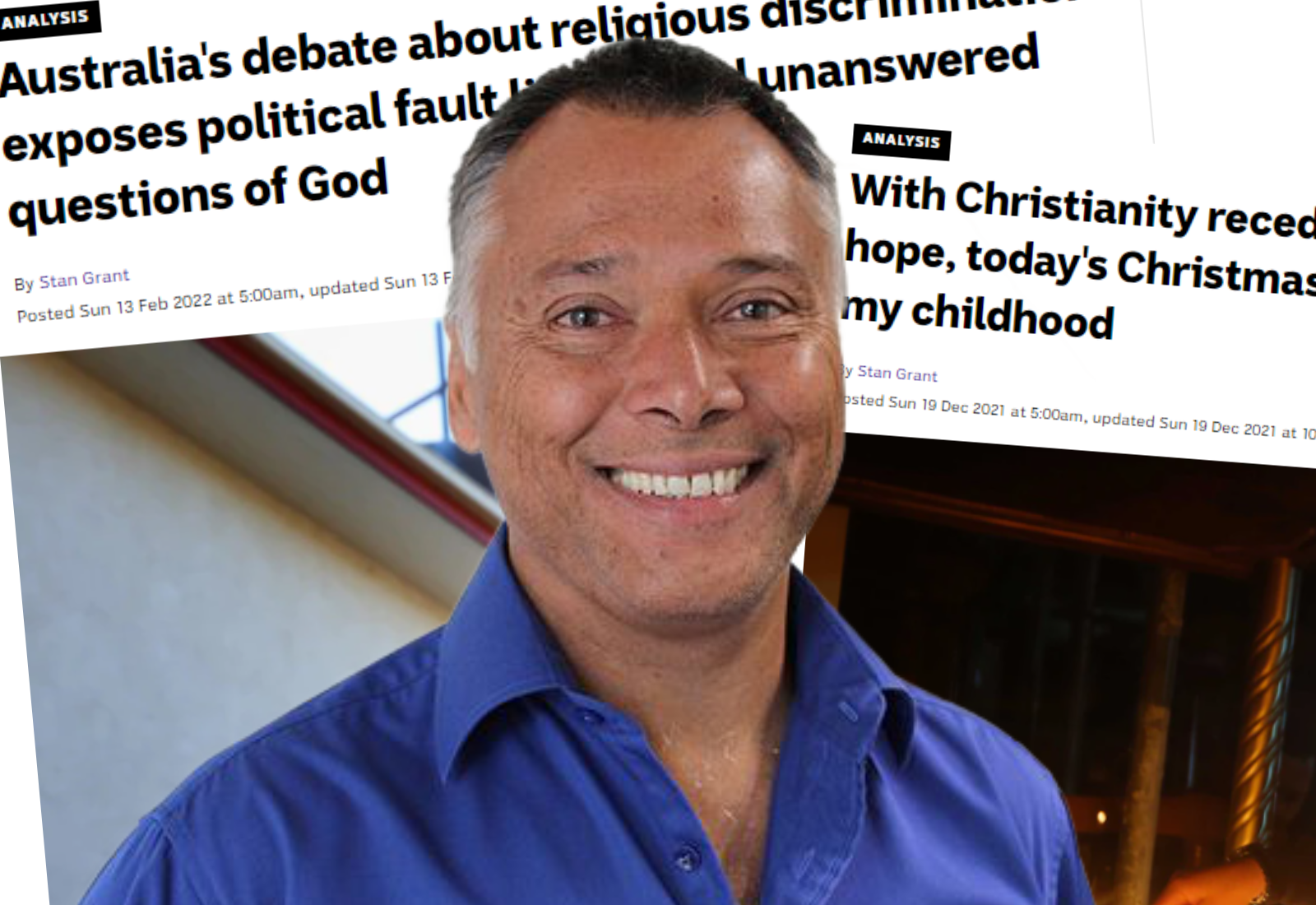We recall the controversy surrounding Emma Alberici’s 2018 article about corporate tax cuts. Subsequently, the ABC judged it to have crossed the line from analysis into opinion. According to ABC Editorial Standards, analysis articles must be impartial, presenting a diversity of views without favouring any single view. “The primary purpose of analysis (including live commentary) is to aid understanding and provide richer context and information, rather than to pass judgement or sway opinion”.
With that in mind, consider Stan Grant’s analysis of the religious discrimination debate, ‘Does Australia have a God Problem’ , and his previous article ‘With Christianity receding and many abandoning hope, today’s Christmases are not like those of my childhood.’ Both overtly favour Christianity while bemoaning the rise of secularity and secularism.
In the first article, Grant takes us on a swashbuckling ride charting the retreat of faith from the Middle Ages until now. The pretence of analysis is achieved by quoting selectively from academics.
Grant quotes academic Olivier Roy, “secularisation has given way to large-scale de-Christianisation”, and “a serious crisis surrounding European identity and the place of religion in the public sphere”.
France is afraid of God, according to Atlantic writer, Rachel Donadio. Charles Taylor, author of A Secular Age, describes how “modernity cannot but bring about a death of God”. Without faith, liberalism is “unsure of its moral basis”, according to political philosopher Judith Shklar. The assembled snippets suggest modern societies are void of meaning and moral grounding without faith.
Grant takes out the hammer with Christian theologian John Milbank: “Secularity itself, Milbank says, relies on an ‘ontology of violence’; it ‘assumes the priority of force and tells us how this force is best managed and confined by counter-force’.”
Some will bristle at the idea violence is somehow inherent to secularity. This sounds like the old trope of atheism equals immorality – we can’t be good without God.
Some will bristle at the idea violence is somehow inherent to secularity. This sounds like the old trope of atheism equals immorality – we can’t be good without God.
However, Milbank’s theories reference the historical rise of the nation and the ideas of Thomas Hobbes where the state holds primacy over faith. When Milbank says violence, he often really means power, noting competing interests in a pluralist society. But, without any explanation, the reference to Milbank is misleading at best, and disingenuous at worst. Where is ABC’s editor?
Grant’s piece culminates as follows: “John Milbank argues that Christianity itself can reconcile virtue with difference in a way that is ‘living together in agreement, rather than mutual toleration’. He says it is a justice of a ‘real peace, that is more than just suspended warfare’.”
Endorsing fringe theological views is more than mere ‘analysis’. Dispensing with modernity and retreating to politics of pre-modern Medieval times, radical orthodoxy contains the following tenets: rejection of modernity altogether; human knowledge relies on the Divine; truth has no grounding except for an inclination towards the Divine; without God there’s only a “nullity at the heart of things”; science should be governed by theology.
Outside of the halls of theological debate, no one has ever heard of John Milbank. His writing is like an encyclopedia of golden-age thinking.
Grant would probably deny endorsing Milbank’s views. But having characterised modernity as a collection of liberal democracies emptied of moral certainty, Milbank presents as a solution.
Further, our religious freedom debate had nothing whatsoever to do with Milbank’s ‘radical orthodoxy’. Besides Stan Grant, what politician, interest group, or media commentator has referred to these views? Though the debate was feisty and hurtful, it would be a stunning result if our elected leaders decided to do away with Enlightenment values, science and liberal democracy and head straight back to the year 1500.
Prior to Christmas, the ABC published Grant’s, “With Christianity receding and many abandoning hope, today’s Christmases are not like those of my childhood.” A familiar tale of ‘Christianity under attack’ which concludes with the following ex cathedra pronouncement: “Our world is immeasurably poorer for the loss and derision of faith and the substitute of cynicism.”
Clearly, this is an opinion. It’s also just plain wrong.
The developed world is measurably richer and better off today than in the centuries when Christendom ruled. Counting the ways – in wealth, health, medicine, infant mortality, longevity, leisure time, working hours, conflict, crime, even income equality/inequality – we live with comforts scarcely imaginable several centuries ago. And all with a corresponding decline in religiosity.
If the recent debate between faith and reason has told us anything, it’s that certain faith-based beliefs and the rights of LGBTI and transgender people are irreconcilable. Waleed Aly highlighted the zero-sum nature of the contest. Allowing faith-based employers full licence to act in accordance with their faith undermines the rights of those they employ and service, particularly LGBTI and trans folk.
The other takeaway is that our community has little patience for legislation allowing religious groups to discriminate. Religious freedom should not weaponise discrimination, and the rights of individuals should take precedence over the desire of services providers to maintain a certain faith-based ethos. Human rights trump human beliefs.
Finally, I think the ABC should call Stan Grant’s articles ‘Opinion’ rather than ‘Analysis’. I, for one, can’t wait to see what he’d come up with once freed from the shackles of analysis.
Photo: Inset image by ABC Local





I too read Stan Grant’s 2021 “Christianity receding…” essay but, perhaps, with less of Hugh Harris’ critical eye, or necessarily as a sample case expounding journalistic opinion peddled as a piece of analysis. This is partly because, well, the ABC is the ABC. As long as I can remember, our ABC has pushed for political correctness, the backing of minority politics and the censorship of dissenters under discrimination law while demonising conservatism, Judeo-Christianity and Western civilisation. I see and read Stan Grant as someone coming from that organisational culture, and perhaps that’s a part of Hugh Harris’ point.
To be fair, Grant’s “our world is immeasurably poorer for the loss and derision of faith and the substitute of cynicism” comment is taken from the full paragraph that reads: “My Christmases are sadder now that my grandparents, uncles and aunties are gone. Our world is immeasurably poorer for the loss and derision of faith and the substitute of cynicism.” This is important context because Grant spends a good portion of the essay regaling his childhood and his early memories. He writes, “like many, my best Christmas memories come from childhood. Endless hot summers, the river, food and family. And faith.” As far as Grant is concerned, “there’s no Christmas like a black Christmas.” In the absence of much money, presents were few and modest, but they were treasured.” And, he goes on, “they were blessed. Christmas was a time of prayer and hope.”
Thanks for commenting Jack.
I think you make a fair point, since I anticipated the accusation of taking Grant out of context. I could have included a host of caveats to overcome this objection but decided it wasn’t worth diluting the main point.
His statement, “Our world is immeasurably poorer for the loss and derision of faith and the substitute of cynicism”, stands out as a grandiose claim which consistent in every way with his litany of scholarly quotes in the “God problem” argument bemoaning the general rise of secularity, and loss of faith.
I believe this statement is not only intended to sum of the context of the article. I don’t think he is merely saying, I am sad because our family and community has lost its connection with faith. The context is the Trojan horse he uses to smuggle opinion in as analysis – the literal meaning of that sentence ; that our world is “immeasurably poorer” overall. I think I am justified in assuming that Grant is trying to illustrate the wider point (“world is poorer”), as well as the contextual point, because of the gist of his second article (which was the main focus of my piece), which is entirely consistent with he “world is poorer” opinion. I am certain this is what Grant believes, and what he is trying to say.
So whilst I accept you are technically correct, I think a reading of both articles combined, the statement (“world is …poorer”) warrants the response it got.
Henry Haszler asked me to post this comment for him:
In his Rationale article Hugh Harris takes issue with comments in Stan Grant’s article [ABC] on Christmases past and present. I’m not defending Grant’s article. But I suggest it is illogical to suggest that Grant’s point about “… the loss and derision of faith and the substitute of cynicism”, is incompatible with the point that “we live with comforts scarcely imaginable several centuries ago. And all with a corresponding decline in religiosity.”
I suggest Hugh Harris’ comment fails to recognise the differences between ex ante and ex post circumstances and so falls into the same trap as does so much commentary on advertising which mixes up these actual and potential outcomes as in:
• There is an ad campaign but the sales of the promoted item fall which is taken to mean the ads did not work. Possibly, but the sales may have declined even more without the ad campaign.
• There is an ad campaign and sales increase which is taken to mean the ads did work. Possibly, but sales may have increased even without the ads. And if the ads are rubbish, left to themselves they may even have actually reduced sales.
So to Harris’ arguments with Grant’s comments, in an ex post sense, certainly “we live with comforts scarcely imaginable several centuries ago.” But [equally] our lives [today] may still be much better in some ways if “… the loss and derision of faith and the substitute of cynicism” had not occurred.
Henry Haszler
Thanks for the comment Henry.
I admit that it is possible that:
1. “Our world is immeasurably poorer for the loss and derision of faith and the substitute of cynicism.”
2. Despite the fact we are much richer now in wealth, health, medicine, infant mortality, longevity, leisure time, working hours, conflict, crime, even income equality/inequality….we live with comforts scarcely imaginable several centuries ago.
I could have spent a lot of time in justifying how the change in focus from the pre-modern world from an enchanted world based on dogma, to a, enlightened world governed by scientific and technological development, has led to the measurably increases in well being. ie. the relationship between a loss of faith and a rise in the use of reason.
But I take it as read that most Rationalist readers of my article would be familiar enough and accepting of this concept as a given.
Perhaps that assumption is wrong?